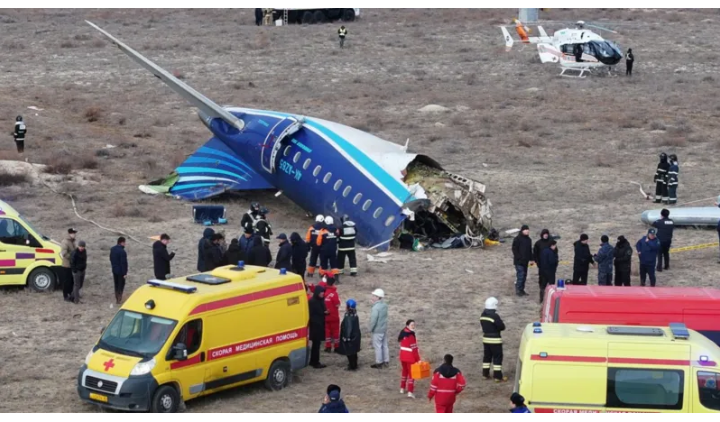US Points To Possible Russian Responsibility In Azerbaijan Airlines Crash.
White House spokesman John Kirby has revealed “early indications” that Russia may have been responsible for the Azerbaijan Airlines plane crash on 25 December, which tragically claimed 38 lives. While Mr Kirby declined to provide further details, he confirmed that the US has offered assistance in the ongoing investigation.
The Embraer 190 aircraft reportedly came under fire from Russian air defence systems while attempting to land in Chechnya. Diverted across the Caspian Sea to Kazakhstan, the plane ultimately crashed, killing all but 29 survivors.
The Kremlin has refused to comment on the allegations, although Russia’s civil aviation agency acknowledged “complicated” conditions in Chechnya due to Ukrainian drone activity. Rashad Nabiyev, Azerbaijan’s transport minister, described the incident as involving “external interference,” suggesting the aircraft was damaged internally and externally during its ill-fated landing attempt. Survivors reported hearing three explosions above Grozny, further fuelling speculation about missile involvement.

Aviation experts in Azerbaijan believe the plane’s GPS systems were disrupted by electronic jamming and that shrapnel from a Russian air-defence missile blast caused the damage. Pro-government MP Rasim Musabekov stated unequivocally, “The plane was shot down over Russian territory, in the skies above Grozny.”
Flight attendant Zulfuqar Asadov described the chaos on board, recounting how a “strike” caused panic among passengers. “There was another strike, and my arm was injured,” he added.
The pilots are being hailed as heroes for their efforts to save lives, managing to land part of the damaged plane despite losing their own lives in the crash. Vigils have been held in Azerbaijan to honour their bravery.
Kazakh authorities have been treating the injured and collaborating with Azerbaijan on the investigation. However, Azerbaijan has rejected proposals for a regional inquiry involving the Commonwealth of Independent States (CIS), a body led by Russia, and is demanding an international investigation instead.

As the inquiry continues, calls for transparency and accountability have grown louder. Despite mounting evidence, Kremlin spokesman Dmitry Peskov has insisted that conclusions cannot be drawn until the investigation is complete.

